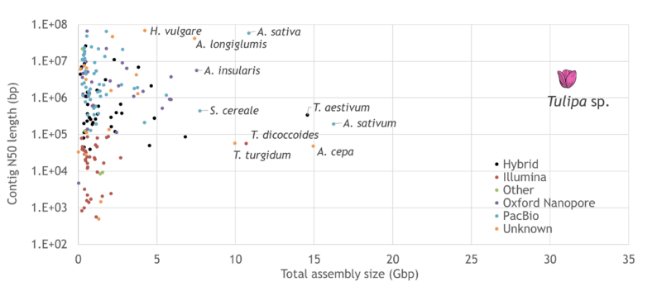Application of a high-quality genome assembly to accelerate Tulip breeding
Researchers in the Netherlands at Genetwister Technologies, in collaboration with Dümmen Orange, have captured the full genetic information of the large and complex tulip genome in a high-quality genome assembly.…
Researchers in the Netherlands at Genetwister Technologies, in collaboration with Dümmen Orange, have captured the full genetic information of the large and complex tulip genome in a high-quality genome assembly. This milestone was presented at the Ag-AGBT meeting March 27-29 in San Antonio, Texas.
Complex genome
Tulip is an iconic Dutch flower with an extremely large genome. Its 33 Gb of genetic information is approximately ten times the size of the human genome. Furthermore, the tulip genome is highly complex, consisting mostly of transposable elements and other repetitive sequences, and genes represent only a very minor fraction of the DNA. To be able to assemble such a complex genome, researchers at Genetwister developed protocols to obtain high molecular weight (HMW) DNA and sequenced it on the PacBio HiFi platform. These accurate long reads can distinguish among the many very similar transposable elements and in-house developed bioinformatics pipelines were used to assemble the reads in the correct order. The resulting high-quality tulip assembly represents the largest genome assembly of an ornamental species to date (see the figure below) and is used by Dümmen Orange to accelerate the development of new tulip varieties

Figure: Comparison of tulip assembly statistics (size and N50) to Liliopsida assemblies deposited in NCBI
Breeding better tulips
Tulip breeding is hampered by the long generation time, and the development of a new cultivar in the traditional way takes more than 20 years. Having genome and DNA marker information accelerates tulip breeding and allows faster release of new varieties improved for important traits such as vase life and disease resistance.
Twan Kranenburg from Dümmen Orange comments: “Having this high-quality genome allows Hobaho by Dümmen Orange to make DNA-based decisions in the tulip breeding program, in a way which was not imaginable a decade ago. The new genome opens up many possibilities to dedicate and focus our breeding program towards important traits like disease resistance, which lead to a better world with the use of less pesticides.”


